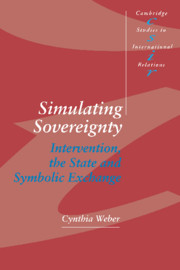Book contents
- Frontmatter
- Contents
- Preface
- Acknowledgments
- 1 Writing the state
- 2 Examining the sovereignty/intervention boundary
- 3 Interpretive approaches
- 4 Concert of Europe interventions in Spain and Naples
- 5 Wilson Administration actions in the Mexican and Bolshevik revolutions
- 6 United States invasions of Grenada and Panama
- 7 Symbolic exchange and the state
- Notes
- References
- Index
- Titles in the series
1 - Writing the state
Published online by Cambridge University Press: 30 September 2009
- Frontmatter
- Contents
- Preface
- Acknowledgments
- 1 Writing the state
- 2 Examining the sovereignty/intervention boundary
- 3 Interpretive approaches
- 4 Concert of Europe interventions in Spain and Naples
- 5 Wilson Administration actions in the Mexican and Bolshevik revolutions
- 6 United States invasions of Grenada and Panama
- 7 Symbolic exchange and the state
- Notes
- References
- Index
- Titles in the series
Summary
Can one say anything about statehood without beginning by deciding what sovereignty means? When this question is considered in light of most of the literature in international relations, the answer appears to be probably not. Few scholars would admit this answer, yet when one considers how international relations theorists give accounts of history, concepts, and issues in their discipline, they seemingly are presented with a choice between two opposed options. They may provide explanations from within the tradition of realism which takes individual sovereign states as its point of departure. Alternatively, they may give their accounts from within the tradition of idealism which takes a community of sovereign states as its point of departure. Either way, sovereignty is a central component of their discussions. Sovereignty describes states either individually or in a community. Thus sovereignty serves as a fundamental point of reference in international relations, a ground or essential modifier for the state.
Even though the concept of sovereignty performs as a referent for statehood, debates in the international relations literature suggest that the meaning of sovereignty is not clearly defined (Biersteker et al., 1993). Generally, sovereignty is taken to mean the absolute authority a state holds over a territory and people as well as independence internationally and recognition by other sovereign states as a sovereign state. However, when confronted by questions about the specific meaning of sovereignty, international relations theorists readily admit that precisely what sovereignty means remains rather fuzzy. In response to this problem of meaning, theorists may follow Ernst Haas who once wrote, “I do not use the concept at all and see no need to” (1969:70), thereby neglecting the concept altogether.
- Type
- Chapter
- Information
- Simulating SovereigntyIntervention, the State and Symbolic Exchange, pp. 1 - 10Publisher: Cambridge University PressPrint publication year: 1994

